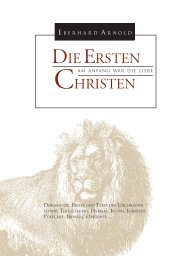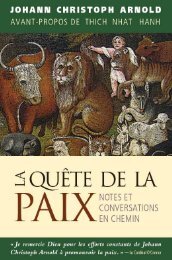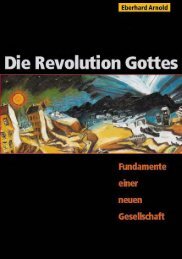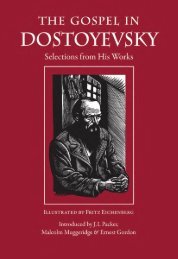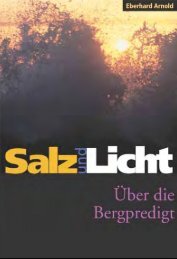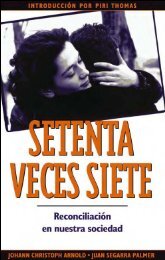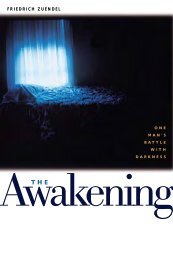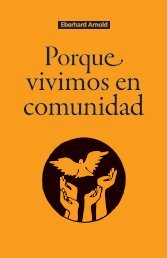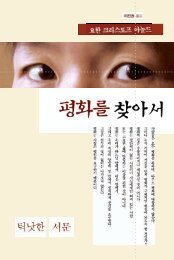Rachoff: A True Story - Plough
Rachoff: A True Story - Plough
Rachoff: A True Story - Plough
Create successful ePaper yourself
Turn your PDF publications into a flip-book with our unique Google optimized e-Paper software.
Published by <strong>Plough</strong> Publishing HouseWalden, New YorkRobertsbridge, EnglandElsmore, Australiawww.plough.com© 2015 by <strong>Plough</strong> Publishing HouseAll Rights Reserved.Der Fall <strong>Rachoff</strong> (“The Case of <strong>Rachoff</strong> ”) was first publishedby the Furche Verlag, Berlin, in 1919. This imaginative storywas inspired by the life of Vasily Osipovich Rakhov (bornca. 1861), who wandered through Russia serving the poorand was imprisoned for eight years in the Suzdal Monastery.Accounts of the historical Rakhov’s death vary.
<strong>Rachoff</strong>READER, BEHOLD YOUR HAND. Sometimes I watch my own as I write; oras I hold it up, fingers spread, so that it gleams like a pale staragainst the dark background of books piled on my table. Thehuman hand –this bundle of bones, flesh, and nerves – think of allit can do. It can bless or curse. It can draw blood or bind a wound. Itis gentle, agitated, vicious; supplicating, ardent, tender. It can weldan iron bridge or caress a child’s head. It possesses the power toboth harm and healRACHOFF WAS FOURTEEN when the devout old Timofei, a dealer inwheat and a guest in his father’s house, laid a blessing on him.Taking the young man’s hands in his, Timofei reverently made thesign of the cross on them and said, “Vassili Ossipovich <strong>Rachoff</strong>, Ihereby set a seal on your two hands, that you may never use themfor anything evil, impure, or shameful, but only to comfort, give,and heal. Your hands shall rest tenderly on brows furrowed withpain and care; they shall gently rub weary backs. They shall carry
2food, drink, and warm clothes to the poor. They shall be a blessingto everyone.”Deeply stirred, <strong>Rachoff</strong> knelt before the old man for a long time,his large, earnest eyes searching the wooden floor, his ears reddeningwith a sense of inadequacy. Timofei’s words had struck him andsunk quickly to the depths, and yet he could still hear their echoes,their strange and wonderful sound. What did they mean?Timofei turned and went, and not long afterward he died. But hiswords did not die. “Your hands shall be a blessing to everyone.”That was at once a consecration and a call. God himself had put thewords into Timofei’s mouth, and they had power. Power to changeand to purify. Power to grant a vision that grew ever clearer.<strong>Rachoff</strong> was born in 1861, the son of a respected citizen inArchangelsk, a city far in the North between the vast Russian tundraand the WhiteSea. Like Timofei,his father was agrain merchant,though well-todo.<strong>Rachoff</strong> grewup in his father’slarge,stone townhousenear theharbor and wasThe restored villa of a 19 th -Century German merchant inpresent-day Archangelsk.expected tofollowin his father’s footsteps. After he turned seventeen he was apprenticedto a family friend, a erchant who owned a large German exportfirm, and every day he went to this man’s house to learn all hecould about commerce.
3Though successful, <strong>Rachoff</strong>’s master was not a worldly man but asincere believer who was more concerned with inner, rather thanouter, things. On <strong>Rachoff</strong>’s eighteenth birthday, he presented theyoung man with a Bible. Looking at him intently he said, “You areas a son to me, dear <strong>Rachoff</strong>, and I have long wished to seal youreyes as a father would. See clearly when you read this book. Everythingdepends on it. If your eyes are not truly open, you may aswell be blind.” Then he blessed <strong>Rachoff</strong>, saying: “I seal your eyes asa father would, so that God’s Word is not an obstacle to you but asource of comfort, wisdom, and peace. Your eyes shall see nothingin this holy book but Jesus’ power and great love.” <strong>Rachoff</strong> stoodthere, startled and perplexed as the strange word “seal” rang againin his ears. What could it mean?Soon <strong>Rachoff</strong> was reading the Bible almost every evening. He hadto read it secretly, for his father, an Orthodox believer who felt thatthe study of God’s Word was better left to priests, would not haveapproved. But that did not matter, for the merchant’s words weretrue: Jesus spoke to him from every page – and not only spoke, butturned his life upside down, robbing him of complacency andsetting him on edge. And that is how it should be, because it iswritten, “He who draws near to me draws near to the fire.”The next winter a distant cousin moved into the city with his family.He was a poor man and did not wait long to inform <strong>Rachoff</strong>’sfather where he lived and how he was related, so one Sunday afterdinner, <strong>Rachoff</strong>’s father, who was tired of his pestering, set out withhis son to visit the man and see for themselves whether somethingcould be done.As they entered the house – really a squalid, cavern-like cellar –they saw that the entire family of seven lived in one room. The
4children huddled in it were famished and half-naked, and the floorso dirty it made <strong>Rachoff</strong>’s skin creep. The man motioned them totake seats in two peeling painted chairs, and as he did, his wifedarted forward to wipe a brown smear from one of them. <strong>Rachoff</strong>grimaced, then sat down anyway. What else was there to do? Helooked around. There was one window, a small, high opening in onewall, but the light it let in was wan, and the draft that seeped fromit sour and chilly.<strong>Rachoff</strong>’s father sent for food from a nearby inn, and meat wasbrought. As soon as it came, the man, hunger-crazed, thrust hisfingers into it, snatched up a piece, and devoured it. The rest of thefamily followed suit. It was a dreadful sight, one <strong>Rachoff</strong> wouldnever forget. What filth – what degradation! His heart tightenedat the sight of such broken, animal-like beings. And to think thatthey were his own relatives!That evening his thoughts kept turning to Jesus. For was it notJesus who had forced his eyes open, searing them as if with sparksflung from a burning fire? He broke down, weeping. What wouldJesus have done? Waves of shame rolled over him, for he knew theanswer. His hands would have soothed and healed and given blessing.After that night new insights burst upon <strong>Rachoff</strong> at every turn,driving him forward and dismantling every cherished and long-heldassumption. Even the church brought him no peace. Previously thebells had rung out sweetly, dispelling all his troubles and inspiringhim to prayer. Now their chimes unsettled him, reminding him onlyof the bishop’s endless wealth, and the grinding poverty of thepeasants who flocked to hear him. Previously the statues of thesaints had awed him, as did the candles (some weighing a hundredpounds and costing a thousand rubles apiece), the gilded images,
5and the wall hangings. Now, however, he saw that such beauty wasreally a pious distraction from reality – from the wretchedness ofthe poor who sought comfort in its intoxicating veil.At length, driven by his disquiet, <strong>Rachoff</strong> attempted his first actof charity. It was a gray, rainy day in February, and from his windowhe saw a rag-ged old mantottering along thestreet. With-out a word toanyone, he went out andcalled the beg-gar into hisroom, bathedhim, dressedhim in cleanclothes, fedhim, and of-fered him hisown bed. Stupefied,theman stared first at<strong>Rachoff</strong>, thenat his fine furniture,then atthe tapestrieson his walls.He shook hishead. <strong>Rachoff</strong>, The ornate domed ceiling of a Russian equally tongue-tied, let him goorthodox cathedral.– and with him,his gold watch, as he was embarrassed to discover the next morning.After this incident, a period of disillusionment set in, and <strong>Rachoff</strong>began to doubt the value of generosity. For a while he evenadopted his father’s way of thinking, whereby the poor were allclassed as one kind: cheats and liars responsible for their ownplight; undeserving riffraff who had no sense of what it meant toearn money.Yet Jesus continued to work in him, and soon <strong>Rachoff</strong> was againrestless and unable to find peace. In his turmoil he went to a Marxist, a
6preacher who believed that the State would one day be replaced bya just economic system and a citizenry of equals. Such was hisdream. At first <strong>Rachoff</strong> was attracted by his oratory, but when herealized that the man was intent on seizing political power, byarmed struggle if necessary, he turned away. The Jesus he knew wasa humble man.IN 1881, WHEN RACHOFF WAS TWENTY, his old master, the merchant, senthim to manage a sugar-beet factory in a village not far from thecity. <strong>Rachoff</strong> was happy to go, but after a year and a half the desolate,unending landscape began to depress him, as did his employees,many of them uncouth peasants given to heavy drinking and wildbehavior. <strong>Rachoff</strong> tried hard to reform them, but nothing he didseemed to work.Then he met Irina Nesterova. The wife of a peasant farmer anddealer, Irina was a kindly, bespectacled little woman of about fifty,and a devoted disciple of Jesus. When she spoke her eyes shone,and her warmth of heart and kindly voice won over everyone whomet her, including <strong>Rachoff</strong>. Four families lived in Irina’s house, andthough they had once been rough and disorderly, their mannershad gradually yielded to her steady calm. Irina belonged to a smallgroup of believers, and once a week (on Fridays, the day Jesus died)she gathered its members at her house, where they franklyconfessed their sins, encouraged one another, and prayed and sang.Unlike the upper half of the village, where <strong>Rachoff</strong>’s factorystood, Irina’s half – the so-called lower village – was transformedby her. When someone was sick, she visited him. On cold days shebrought tea to the laborers in the fields; on hot days she carried
7them water. When a woman was beaten by her drunken husband,Irina would be the first one at the house, mellowing him withfriendly gestures and then admonishing him with firm words. InIrina, the spirit of Jesus was at work.“Little mother,” <strong>Rachoff</strong> asked her one day, “What are yourteachings? What are your beliefs about God, about the rich andpoor?”“In my eyes they all live in bondage,” Irina replied, “the richjustas much as the poor.”“The rich!” exclaimed <strong>Rachoff</strong>. “How can they be, when they livein such warmth and comfort?”“No one is free just because he has possessions,” said Irina. “Andmoney does not necessarily mean wealth. Yes, even the richest manis poor. And so is every other being. The whole creation moans underthe weight of a terrible sadness. The earth itself cries out as ifin pain. There is sighing among the animals and the trees, in thesprings and the rocks, in the fire and the stars. But Jesus will come.He hears every groan, and he will come to rescue us from our grief.His spirit heals and reconciles and blesses; it comes to us and dwellsin our midst, and it can – through grace and hard work – pry us freefrom our bondage and make us like children.”“Children?” <strong>Rachoff</strong> puzzled.“Yes, children.” Irina repeated. “<strong>True</strong> children are joyous,whether they are fed with a hundred rubles or three kopeks a day,for the spirit of Jesus lives within them.”“You are right, Mother Irina,” said <strong>Rachoff</strong>. “I remember myfriends, the Lupkins of Archangelsk, whose son is ill all the time. Hesuffers from a chest infection and has undergone surgery many
8times, but nothing will help him, so wrapped up he is in his ownmisery. His sister is healthy, but just as unhappy. Spoiled and bored,she stands hour after hour at the window, dreary and sullen,though surrounded by comforts and possessions of every kind.Their parents are both given to bad moods and violent quarrels,and even on the best days they live in a state of continual nervoustension.”Irina nodded. “There is coldness wherever people are not yethealed by the Spirit. But how different it can be with Jesus! Youknow my Natasha. She’s been bedridden for three years with tuberculosis,but never cries or complains. She’s rarely unhappy, for sheis filled with hope and love.”<strong>Rachoff</strong> listened to her words, and longing for the same spirit,asked her, “Give me your blessing, Mother Irina.”“Gladly,” she answered, “I will set a seal on your heart.” And withthat she made the sign of the cross over his heart, saying, “Jesusalone shall rule in this heart. Away with all sadness and complaining!Come, spirit of God, dwell here within this man, and grow until heis filled with your purifying love.”<strong>Rachoff</strong> trembled and his eyes welled with tears, for it was nowthree times that he had been thus blessed. A threefold seal! Andnow it was clear to him what it meant. His hands must become likeJesus’ hands: tender, and eager to serve. His eyes must become likeJesus’ eyes: clear, loving, and sincere. Finally, his heart mustbecome one with Jesus’ heart, finding peace in the Father with thesame trust and certainty that Jesus had.Youth is never clear sailing, however, and many storms still lay aheadfor <strong>Rachoff</strong>. He confronted greed and cruelty, self-righteousness, lust,
9and deceit, yet still he did not fully accept the task that had beenlaid on him. And though he knew he must serve Jesus, it seemed asthough the Master did not welcome his attention, but stoodconstantly at his shoulder, wielding the whip of another exactingdemand, calling him to sacrifice and give still more. What tormentit brought him! For <strong>Rachoff</strong> did not yet see how everything thatopposes God must be destroyed within a man before he can findpeace, and before there is release from the anguish of unansweredsearching.Back in Archangelsk, <strong>Rachoff</strong> was consumed both with a feelingof restlessness and a premonition of approaching fulfillment. Hewas twenty-two now, and his mother meant to find him a wife. Infact, she claimed to have found one – a kind and well-off woman.But things turned out quite differently.One autumn night, after hours of inner striving, <strong>Rachoff</strong> had adream. In it he saw a fallow field stretching far into the distance,sloping gently upward until it met the sky. Suddenly a shining lightappeared above the horizon and began to move slowly toward him.He saw that the radiance surrounded a simply dressed, yet noblefigure, a man in a brown robe, guiding a plow and coming downthe newly turned furrow. The man was not alone, but accompaniedby an adoring throng.All at once the air was pierced by a sound – the thin, steady toneof a bow being drawn across the string of a violin. Or was it themuted cry of a baby? The man at the plow looked up and listened.The crowd held its breath. The sound was coming from a nearbyhut. The man walked over and entered it.<strong>Rachoff</strong> followed, and saw that the sound was coming from ababy. Silent, he watched as the man gathered it up and kissed it, at
10which the crying stopped. A natural gesture, one might think. Butit was so tender, so infinitely compassionate, that <strong>Rachoff</strong> wasmoved to tears. Stumbling blindly back out of the hut, he returnedto the crowd. It had changed to a mob, and the cheers to contemptuousscoffing.<strong>Rachoff</strong> was unable to stop weeping. He could not have explainedit, but he had just seen what he had longed for through all the yearsof his unrest. He had seen Jesus – Jesus, stooping to pick up a littlechildSuddenly <strong>Rachoff</strong> was wide awake. Jumping from his bed, heknelt down on the floor and gave fervent thanks for his dream;then, with nothing but the clothes on his back, he slipped silentlyout of his parents’ house.The moon was bright; a soft breeze tousled his hair. He strodedown the road with a light, glad step. Once he stood still for amoment, contemplating the meaning of his vision, but then hisheart rose high within him, and he stepped out again, even morebriskly. This was no time to interpret a dream. He had seen Jesus –that was all that mattered –and Jesus was no longer a goad, a piercingarrow, a source of unrest. He was a well of peace, a fire of love,a sun of joy. He was cause for unbroken praise.Gratitude and exultation swept over <strong>Rachoff</strong>. He broke into arun, and ran on and on toward the dawn, shouting into thedarkness and the springing wind, “Brother Jesus, here I am. I amcoming! I am coming!”
11FOR FIVE DAYS RACHOFF TRAVELED eastward, until he reached the districtcapital of Pinega, and on the sixth day he walked further, toRadinovka, a village of poor workers. Twilight was falling when hecame, and a light autumn rain stirred the dust of the unpavedstreets.In front of the first house <strong>Rachoff</strong> passed he met a rough-lookingwoman with untidy red hair, driving a herd of pigs.“Is there a holy man in the village?” he asked.“Yes, there’s a dear old father here,” she replied. “He usuallyprays and sings, but he’s lying sick just now. Come with me.”The woman brought <strong>Rachoff</strong> into a nearby house, and there hefound an old man with swollen feet, lying near a brick stove withhis legs wrapped in afleece. “Tell me, dearbrother, are you a manof God?” <strong>Rachoff</strong> askedhim. “I greet you withjoy in the name of JesusChrist. What is yourname? Mine isA 19 th -century cabin in a village outside Kiev.<strong>Rachoff</strong>.”“My greetings to you, too, wandering brother,” replied the man.“But how sad that you have a name. I have no name; I am nameless.”“What do you mean by that, my brother?” asked <strong>Rachoff</strong>.“The one who is above is nameless,” the man returned, pointingupwards. Then, pointing to himself, he went on, “And the one who
12is above is the one who lives here. The two are one and the same. Iam a part of him, a part of the nameless one. That is what GregorPetrov told me when I was in Tambov with the army. Gregor was aGod-fearing peasant, and he read this in a holy book, written in theholy language and given to him by a venerable man.”“Come here to me, and I will make you better, dear Father Nameless,”<strong>Rachoff</strong> said.The old man obeyed, and <strong>Rachoff</strong> took a bucket of warm waterfrom the stove and washed and massaged his legs. He was like achild, <strong>Rachoff</strong> thought.“What else was written in the holy book, dear Father Nameless?”he inquired.“It said, my dear friend, that true faith is a daily fight, and fasting agood aid in overcoming the flesh. It said, too, that men should livesingly and pure, like the angels in heaven. Even if they are married,they ought to abstain, praying until every desire is conquered, anddoing so with the help of a copper cross around their neck. Look,here is mine!”At this the old man tugged at his crucifix, then went on: “Oneday judgment will come, and God’s people will be counted, andonly those will be saved who wear a cross, like I do.”The old man rambled on, talking now wisely and now foolishly,while <strong>Rachoff</strong> finished tending to his sores. Night had come, andthe room was filling with curious women and children. The menwere at the tavern. Later <strong>Rachoff</strong> knelt and prayed with his listeners,and read to them from the gospels.Afterward the women returned to their shacks, and then the menreturned, stumbling in the dark, beating their wives and children,
13and causing one petulant outburst after another. <strong>Rachoff</strong> sat in thedarkness and listened to their angry shouts, waiting for the uproarto subside. He knew now that this was the place for him to stay.<strong>Rachoff</strong> stayed two years in Radinovka, going from house tohouse and sharing in the work of the villagers. Above all he chosejobs that no one else wanted to do. He helped care for the sick,scrubbed dirty wooden floors, scraped molding walls and whitewashedthem, cleansed neglected animals, and shoveled outoverflowing stalls.He taught the children to speak Russian, for they knew only thelocal dialect, and how to read and write. He also read the gospel tothem and told them stories about Jesus, saying, “It is not enough tohave his image in a little shrine in a corner of the house. We mustkeep him in our eyes and hands, and in our hearts.”In the evenings he gathered the villagers and strengthened themin faith, teaching them that not asceticism – not fasting or abstaining– but Jesus alone is the power that overcomes the world. They tookhis words to heart, and as they did, the men were weaned from theirdrunken ways, and the women from their gossip and backbiting. Eyesbecame gentler, hands more peaceable, and words kinder and moreunderstanding. Husbands stopped mistreating their wives, who inturn showed new respect to them, and children began to honor andobey their parents.Before long <strong>Rachoff</strong> was accepted as a friend throughout thevillage. Even the smallest children were entrusted to his care, andthough he was only twenty-four, they fondly called him FatherVassili.
14But there was one exception. When <strong>Rachoff</strong> had arrived inRadinovka, the Orthodox priest had kept to his home, sufferingfrom an infectious disease. No one was willing to look after him,not even his wife, so frightened was she of contagion. Only <strong>Rachoff</strong>was courageous enough to visit him, and he brought hot compressesand eased his inflammation. Eventually <strong>Rachoff</strong>’s attentive carecured him.Others might have thanked him, but the priest did not. Jealous of<strong>Rachoff</strong>’s popularity and suspicious that his kindness was really aruse to get him out of bed and back to work, he looked on theyoung man with growing mistrust. As for the young man’s condemnationof strong drink, it made him fairly bristle, for there waslittle he loved like the bottle. “Have you any idea, little brother,”he would complain, “what a sacrifice it is for me to sit here yearafter year in this godforsaken place, toiling and half starving,stranded with a wife and children, surrounded by nothing but thefrozen wastes? Over in Pinega, my hometown, I was a man amongmen. Here I am a man among swine, and drinking is my only salvation.With it I can at least escape this miserable hole for a while and flyback to my good friends – back to the days of my youth. Wine isthe gift of a good God. Why, it is even praised in the Psalms!”To which <strong>Rachoff</strong> replied, “That may be so, but if you would stopdrinking and turn Radinovka from the hellhole you describe into aplace of warmth and love – into a garden for Jesus – you would nolonger hate your life, or want to flee it in a drunken fog.”“A garden for Jesus?” retorted the priest, rolling his eyes. “That’sjust what infuriates me about you. You talk of nothing but Jesus.Always Jesus! It’s enough to make one think you’re from a sect.Can’t you see that the peasants are too thick-headed for him? Find
15me one who’s not a shameless rascal. The two don’t go together.Praying is religion enough. Anyone can do it.”“No,” insisted <strong>Rachoff</strong>, “it is not enough. A Jesus who is onlythere for people to pray to is an idol in the clouds, and what goodis that? We must help each villager to receive him into his heart, hiseyes, his hands. We must let his love live right here among us. He isalready at work. Look at Taras, or at Anissa. Look at almost everyother. Jesus has made his home with them; they have become sonsand daughters of God.”But the priest continued to mistrust him. It didn’t help much thatthe peasants now recoiled from him in disgust as he staggeredalong the street, cursing or guffawing, and reeking of cheap wine.In earlier days they had hurried to him, confiding in him as one oftheir own. They had drunk and joked with him; they had kissed hishand. And now—now they turned to <strong>Rachoff</strong>, that intruder fromArchangelsk. Oh, what wouldn’t he give to be rid of him!One day about half a year later a government order arrived fromPinega, forbidding <strong>Rachoff</strong> to remain in the village. The womenwept, and the men, too, broke down when they heard the news.Only <strong>Rachoff</strong> remained calm. “It is only I, a twenty-five-year-oldman of no consequence, who has been banned. Jesus still remainsin Radinovka; he can still work among you. Only I am journeyingon.”<strong>Rachoff</strong> set out for Archangelsk again, and when he arrived backhome, it was May. Everywhere the wintry tundra was carpeted ingreen. Alder catkins nodded along the water, and flowers bloomed;the fresh-turned furrows breathed with new life. In later years<strong>Rachoff</strong>’s mother would look back on it as a heavenly spring: her
16son was home, and she could once more care for him. And whatwas more, <strong>Rachoff</strong>, who had previously resisted every gesture, nowallowed her to show love to him.Then, as suddenly as he had come, <strong>Rachoff</strong> disappeared. He did sowithout a word, leaving only a terse note: “Jesus is calling, and Imust answer.” And then: “Jesus is still with you.” That was all hewrote.When his mother found the sheet of paper <strong>Rachoff</strong> was alreadylong gone. His gait was confident and upright; his bearded faceweathered, creased by sunshine, wind, and rain. He crossed new vistasdaily, for he aimed to wander all of Russia. Everywhere, peoplewere drawn by is love, and loved him in return. And whether theyadmitted it or not, everyone felt his blessing who returned hisearnest gaze.<strong>Rachoff</strong> demonstrated his love in practical ways. In each villagehe came to, he pulled out his cache of tools – hammer and nails,hand-saw, knife, and string – and offered his services to any whowould take them. When a goat broke into a widow’s garden, hemended the fence for her; when a cripple ran short of winter fuel,he split firewood for a day. Once he cared for a sickly young womanuntil she was strong enough to hold her newborn child. Anothertime he sat with a dying old man until his last breath. <strong>Rachoff</strong> toldhim so vividly about the joys of the world beyond that the manthought an angel had come to him.“You are sure it is not a place of darkness and decay?” he askedabout death.“Oh no!” <strong>Rachoff</strong> reassured him. “You are about to enter thefullness of life – a glorious, bright morning as brilliant as the sun at
17Easter.” And as <strong>Rachoff</strong> went on to describe the beauty of theheavenly realm, the man grew more and more peaceful, so that atthe end he was happy, even eager to pass into the land of eternalspring.SOMETIMES PEOPLE JOINED RACHOFF for a stretch along the road. Oncetwo devoted young women, friends who had heard his call to serve,even followed him for several weeks. They begged food and cookedfor him, washed his tunic and mended his cloak. They might neverhave left his side, had he not shaken himself loose from them.Crowds often came after him as he left a village where he hadstayed, but though kindly and gentle, he always evaded them.Before long a rumor was circulating that Jesus himself wasjourneying through Russia. And truly, his behavior and speech wereso selfless, so pure, that Jesus’ spirit did shine from him, penetratingmany a heart and bearing good fruit.Once in the far southern reaches of Russia, <strong>Rachoff</strong> came upon asect led by a certain Jacob Istomin, who asked him, “Are you one ofus?”“That depends who you are, dear brother,” replied <strong>Rachoff</strong>warm-heartedly.“We are wanderers, travelers, pilgrims,” said the man. “We gofrom place to place. An ascetic named Ivan taught us that a trueworshipper of God is continually on the run from the Antichrist.And so we move on ceaselessly, for the whole world is ruled by theAntichrist, our enemy from the beginning, and all priests andministers and soldiers are his servants. We are unable to resist themin battle, so we flee on and on, across the endless plains of ournative land, and through the vast and kindly forests.
18“We have broken all ties with church and state, and disdain allexcuses for contact with the world. We refuse to pay taxes, to servein the army, to obey government authorities, to respect bishops orpriests. We have no use for documents such as passports, but tearthem up or burn them. Money is meaningless to us, and we neverkeep any on hand. We depend on the devout. They give us food andclothing enough.“The only thing we honor is the small cross that each of uscarries. See, here is mine. Look what is written on it – it wasendorsed in Jerusalem itself. That is the only real passport, for whatare true Christians but pilgrims and strangers in this life? And is itnot so, that only those who escape the world will not becondemned to destruction with it?”<strong>Rachoff</strong> listened quietly until the man was finished. Then, humblybut passionately, he began to speak, reminding Jacob Istominof the simple love of Jesus, and showing up his own complex ideasas delusion: “Jesus is the true king over the earth, and it is he, notthe Antichrist, who shall have the final say. Jesus reigns whereverpeople welcome him, and wherever this happens, the Antichrist willsense his active, living presence, and turn and flee.“It is not the disciples of Jesus, but the followers of the Antichrist,who are always on the run. No, Jesus’ disciples hold theirground with valiant and determined hearts. Jesus builds up, gathers,and affirms. You tear down; you scatter; you run and hide. Jesusblesses; you curse. Jesus unites; you divide. Jesus heals and comforts;he brings peace, joy, and love; and wherever he rules, the Antichristgives way to him. Kneel down, proud man! Kneel to Jesus! He alonehas power!”
19In the end, Jacob Istomin saw the truth of <strong>Rachoff</strong>’s words andfollowed after him, though eventually <strong>Rachoff</strong> threw him off histrail.Down by the Sea of Asov, at the mouth of a great river, <strong>Rachoff</strong>met a withered old hermit named Abrossim. An anchorite whomade his home in a cave, Abrossim was well versed in the lives ofthe saints and, after the manner of one of them, believed thatpeace was found only by withdrawing from the daily affairs ofmen.Abrossim went down to the river each day to catch the fish helived on; otherwise, he spent his hours in contemplation andprayer. At midday he danced in the gray-green grasses of thesteppe, circling slowly on the top of the hill, long beard streaming,cloak fluttering in the wind. That symbolized the dancing of thesaints and friends of God on the holy meadows of Paradise. Atevening he knelt down in front of his cave, gazing in rapture at theeternal movement of the stars. That symbolized the adoration tocome, the holy time when all men will behold God. At midnight helay down in a grave that he had dug for himself. That symbolizeddying, and the importance of readiness for death. Then, on thefollowing morning, he began the day by bowing, then running towardthe sunrise, his hands uplifted in prayer. That symbolized resurrection.So every day Abrossim lived in expectation, acting out a parable ofman’s passage from this life to the next.When <strong>Rachoff</strong> found the anchorite, however, he lay sick, so<strong>Rachoff</strong> stayed in the cave for several weeks, caring for him andlearning a great deal. When they parted, the old man wept andsaid: “You have been like a mother to me, dear brother. Ancient as Iam, I thought of my own mother when you tended me with your
20gentle hands. I thank you for your love. Oh, how I wish my life werestill before me, so I might go out as you do and, in the strength ofJesus, fill the whole world with his spirit! But I cannot. So receivemy blessing, and give me yours.”<strong>Rachoff</strong> traveled on, learning, teaching, and healing as he went.Finally he left Russia and made his way to Jerusalem. Once there,he wandered the city and took in its storied sights, but thoughdeeply moved, he was at the same time heartbroken. Everywherethe poor pilgrims were shamefully exploited, and it wasn’t thehucksters but the priests who cheated them the worst. With deeppain, he recognized that, holy as it was, Jerusalem had no room forJesus. Just as the city had rejected him in the past, so it did now.Judas, the betrayer, would have felt right at home.One day, while watching a great procession,<strong>Rachoff</strong> could hold back his indignationno more. A Greek patriarch,seated on a white, silken throne bornealoft by four strong priests, was makinghis way down the street. Trumpetssounded, and the procession moved like awhite cloud toward a magnificentchurch.Following the throng inside, <strong>Rachoff</strong>A procession of Greek orthodoxwatched as the patriarch was reverentlylowered in front of the gold-en-churchmen makes their waythrough present-day Jerusalem.crusted altar. Then, rising to his full height, he cried out, “You onthe white throne, Jesus is calling you! If you are a shepherd, thentake care of your flock! Look how your sheepdogs are treating thesheep: they are scattering the ewes and devouring the lambs. Woeto such dogs! And woe to the shepherd who cannot control them!”
21Everyone stood petrified by this outburst. Blood reddenedcheeks; faces burned with shame. But the bold young stranger’swords hit home to many. How many of them had traveled fromgreat distances, simple, perhaps, and poor, but devout in theirlonging? And how many more pinched and scraped for years, hopingto nourish their souls by walking where Christ had walked on earth?And here, at the end of it all, what awaited them other than greedypriests who demanded coins for every foolish rite: gold to touchthe hole where the cross had stood, silver to kiss the place wherethe sacred body had lain, copper to have a candle lit, or to place ahand in the crack of some holy temple wall! It was a just denunciation,they knew, and they began to tremble.Meanwhile the rash heckler was seized by guards who pulled himfrom the gaping crowd and dragged him outside and away. Throwing<strong>Rachoff</strong> in a fortress room, they left him imprisoned for a day and anight, with nothing but a jug of water to sustain him.Yet he was not forgotten. At morning, as a cool breeze ranthrough the alleys, a young woman stood under his barred window– a pilgrim who had found him after many hours of searching.Craning her neck to see into the dark opening, she pled, “Oh, whereare you, my Jesus? If only I might see you, here in this city whereyour feet once trod!” <strong>Rachoff</strong> did not answer, but fell on his kneesin the gloom, shaken and humbled to his very depths.BANNED FROM THE HOLY LAND, <strong>Rachoff</strong> traveled north again, until hereached the great city of Odessa on the Black Sea. Everywhere,lavish displays of wealth met his eyes: imposing mansions on broad,tree-lined boulevards; expensive cafes filled with laughing womenand haughty men; luxurious hotels for travelers from farawayplaces such as Paris and Berlin.
22There were magnificent parks, too, bright with roses and oleandersand freshened by fountains and pools. In one square <strong>Rachoff</strong> passeda towering glass sunroom. Behind its windows, elegantly attiredvisitors strolled among potted date palms and orange trees, pluckingripe fruit as they went. In another he passed a well-tended gardenin which a maid sat grooming a miniature dog. Beside her, exotic,fan-tailed fish swam in a tiny pond whose sides and bottomappeared to be painted with gold leaf.But that was not all he saw. On the outskirts of the city, only halfan hour’s walk away, he found coal yards and slaughterhouses, andbeyond them, shacks, tents, and mud. Here lived Odessa’s homelesspoor on bare fields allotted to them by the authorities.Drunken men stumbled through puddles, and bitter-eyed womenhauled pails of brackish water. Gaunt children and wizened cronespoked about in steaming garbage heaps (the city’s daily refuse,carted out by horse) and stuffed their pickings into sacks. The foodwas scanty and only remotely edible – vegetable peels, meat bonesand other half-rotten scraps – but they hoarded it as if it were gold.<strong>Rachoff</strong> was horrified.Still, despite the acrid odors and the raucous, tattered crowds;despite the grubby boys and girls who flung themselves at <strong>Rachoff</strong>,vying for his attention and clamoring for coins; despite the cloudsof mosquitoes, and the mangy, yapping dogs – or was it because ofall these? – he knew he must stay.At first the squatters stared when they saw he meant to take upquarters with them. Then they mocked him, especially when hespoke of Jesus, whom they scoffed at with foul gestures and jeers.But <strong>Rachoff</strong> was not easily discouraged. Knowing that God’s love isbest shown in deeds, he did not try to convince them with words.
23Eventually he stopped talking altogether. For the next half year, hesaid almost nothing to anyone. Diligently, silently, and simply, hebrought Jesus to the people through his hands, eyes, and heart.<strong>Rachoff</strong> helped here, there, and everywhere. In spring he beggedplanks and nails, rakes, hoes, and seeds from a kindly woman ofmeans, and with her gifts built sheds and straightened paths, duggardens and sowed vegetables. Soon even the most suspicious nolonger looked at him askance, but offered their time and help.Then, in one night, it all came to an end. Vandals burned his lumber,broke his tools, and scattered his supplies. They even uprooted hisseedlings and plants. Heartbroken, <strong>Rachoff</strong> went back to the donorand threw himself at her feet. This time she refused to help him.Meanwhile the squatters lost confidence in him as well, and on hisreturn they treated him with contempt.That night <strong>Rachoff</strong> sequestered himself and prayed for hours. Heremained alone the next day too. Then, in the evening, he went intoOdessa, to the heart of itsgrandeur: theopera house.<strong>Rachoff</strong> couldnot have lookedmore out ofplace in thebrightly lit square. It wasopening night,and everywherehe turned, therewas wealth tobe seen. Ornate,horse-drawncarriages cameand went, disbursingsmilingladies in eveninggowns. Trim es-corts breezed byin tails and tophats; ivory canestapped pavingstones; jewelsThe marble foyer of the Odessa Opera House,a stunning example of baroque architecture.
24glinted; glasses clinked. But he did not hesitate. Mounting the imposingmarble steps, he climbed them, bought (with his last savings)a ticket for a front seat, and walked boldly into the great baroquehall.Inside, the splendor almost overwhelmed him. Upholstered redseats were filling with well-to-do patrons, and from the velvetcoveredbalcony boxes above them, cologne wafted down. The airvibrated with titters of anticipation.Near <strong>Rachoff</strong>’s chair, it is true, the mood was decidedly different.As he seated himself, there was silence, and then looks of revulsionand disbelief. Who was this filthy scoundrel, this unwashed tramp?Who had let him in? Why didn’t someone throw him out? Tonguesclicked indignantly, and someone called for an usher, but it was toolate. Already the lights were going out, the curtain lifting. Theperformance had begun.<strong>Rachoff</strong> sat quietly, praying, through the first act. Then, as thecurtain fell, he rose suddenly to his feet. Stepping calmly onto hischair, he turned to the audience and spoke in a strong, clear voice.“Hear me, for Jesus’ sake! Rich brothers, rich sisters, for his sakelisten quietly to a poor servant of Jesus. If you knew half of what Ihave seen outside this city, it would bring tears to every kind eye,wrench every compassionate heart. What misery there is; whatdestitution! Your fellow humans there – no, your brothers – theylive like wild animals. Your lapdogs live better than their children!But it need not be so, and wouldn’t be, if you shared even a smidgenof your food and clothing, your warmth, comfort, power, or educationwith them.”
25There was silence in the great hall, and then a commotion asseveral guards entered from the back and began to make their waytoward <strong>Rachoff</strong>. He went on, louder: “In a moment I will be removed.But let me first begyou to takethis simplemessage toheart: Jesusis crying out in grief.Jesus is wait-ing for youto act. MayJesus planthis seed oflove withinyou, and stirevery manand woman of goodwill!”The grand proscenium of the Odessa Opera House, withprivate balcony boxes on both side walls.Then, turning to the guards, who had just surrounded him,<strong>Rachoff</strong> stretched out his arms. “Here are my hands,” he cried.Until this moment, the audience had remained as still as death, butnow an astonished murmur rose. Opera glasses were trained onhim, and hundreds stood. Few saw his face as he was led away, butthose who did said it shone with joy. And those nearest him heardhim whisper, as if to himself, “Thank you, dear Jesus, for standingby me.”After his arrest, <strong>Rachoff</strong> was dragged off to prison, and forweeks nothing more was heard of him. But the uproar he hadalready caused animated dinner parties and made headlines fordays. “A Blow Struck for Jesus.” “Madman at the Opera.” “Lunatic,or Early Christian?” “A Conspirator for Christ.” It was mostlynervous excitement, and after a while the papers lost interest inthe story. Some first exploited it shamelessly, of course: one
26reporter investigated the squatters’ camp and wrote the mosttwisted piece, praising its primitivism and waffling about the“serenity of life untouched by modern complications.”Yet here and there the seeds <strong>Rachoff</strong> had planted took root andbegan to grow. Certain reform-minded citizens were so horrifiedby the poverty they found on the outskirts of town that theyrallied the city fathers for measures of relief, pressed localmerchants for building supplies and food, and continued to agitateuntil housing was improved, filth cleared, streets paved, andschools established.<strong>Rachoff</strong> never saw the fruits of their work. Charged with incitinga riot, tried, convicted, and banned, he was long gone from Odessa,and out on the steppes, alone with the grass and the sheltering sky,and the songbirds in the clear, blue air.TURNING UP SOME TIME LATER in Kiev, or rather in the slums on its outskirts,<strong>Rachoff</strong>, whowas now aboutthirty, continuedto workwith the poor.He still spokeof Jesus, too,though hiswords mostlyfell on deafOne of the many churches that make up Kiev’s ancient Lavra Monastery.ears. “Herein Kiev we don’t need your Jesus,” people told him, shaking theirheads or elbowing him good-naturedly. “We have the saints;
27they’re good enough to save the likes of us.”It was true. Kiev did have saints, and plenty of them, as <strong>Rachoff</strong>soon learned. His guide was Mironoff, a steward in the LavraMonastery, and one of the only men in the city interested in<strong>Rachoff</strong>’s stories of Jesus.“Deep in the cellars,” Mironoff told him, “lie the saints in whichthe poor have such great faith. There are hundreds of them. Butthey are not really saints. They are the embalmed bodies of deadpilgrims and monks, or effigies with heads of wax, and clothingstuffed with wood shavings or straw. The bodies lie one apiece onbiers covered with black altar cloths; they are dressed in fine silk,embroidered with silver and gold.” <strong>Rachoff</strong> shuddered. But the nextday, after gathering his courage, he joined a troop of worshipers asthey entered the underground vaults.A passage in the Caves of Lavra, where entombed saints still drawthrongs of tourists and pilgrims.At the entrancestood a corpulentmonk with a whipin his hand, demandingthe socalledofferingwithout which noone could go in.After pocketingthe pilgrim’s coins,the monk instructedthem notto touch thesaints, not to dothis, not to do
28that. The only thing they could do was kiss the saints on the solesof their feet.<strong>Rachoff</strong> burned with anger. He looked around at the peasantskneeling everywhere. He breathed in the clamminess of themorgue-like air. He peered at the motionless figures, a cross in eachpair of ashen hands, hair combed severely back, a hood drawnstiffly over each lifeless head. A colored lamp swung above him,casting dismal, quivering shadows; a burning censer moved in slow,steady arcs.Suddenly <strong>Rachoff</strong> knelt down and called on Jesus in a loud voice,beseeching him to reveal the trickery and put an end to the vileshow. Then he sprang up, snatched the whip from the gaping monk,and turned towards the pilgrims. With one kick he knocked astuffed figure from its platform. “Look!” he cried, as it fell apart ina cloud of shavings. “Here’s a good idol for you! Out with you, poorblinded creatures! Out of this cavern of lies!” And he cracked hiswhip so furiously that the pilgrims fled in terror, the fat monkscreaming at their heels.<strong>Rachoff</strong> fled the ensuing confusion, but during the night he wasfound and seized. Lying in prison, he awaited the day of his trial.He planned to defend himself with Holy Writ itself: “Jesus institutedthe lash as a sacrament,” he would say. “It is a tool with which todrive out hypocrites and liars. And Jesus’ disciples, too, must wieldit. That is all I have done.”<strong>Rachoff</strong> spent many days behind bars, but he remained courageousand full of cheer. He knew that the seeds he had planted wouldremain in the soil of every open heart, and in time they would growinto healing herbs. He planted seeds in the prison too. Formerly the
29guards had treated the inmates as wild beasts. Now a few, softenedby <strong>Rachoff</strong>’s kindness, and made vulnerable by his love, began tosee them as brothers – fallen, but still their own kind.Some even approached <strong>Rachoff</strong> in his cell, wanting to know howthey could find happiness for themselves. But he only said: “Wemust be hated for Jesus’ sake. Suffering is a badge of honor to me.”And this was true, for whenever <strong>Rachoff</strong> met with new humiliationsor indignities, he did not grumble, but laughed: “Another medal,then!” That was the secret of his indestructible joy.<strong>Rachoff</strong> was never brought to trial, for in order to avoid theshame of public exposure, the monastery decided to suppress theincident. Eventually he was released and banished to his hometown,Archangelsk.At first he stayed at his father’s house. Then he moved into thecity, where he walked the poorest districts from morning till night,listening and comforting, teaching and offering a helping hand. Inthis street he bought books and taught the people to write; in thenext he gathered the children and read to them from the Gospels.In one alley he made peace between a quarrelling couple; inanother he found decent work for a prostitute. Wherever he wenthe spread Jesus’ love, though also His sharpness against lust anddeceit. That never earned him praise, of course, but only angrykicks and blows.With money given him by his parents, <strong>Rachoff</strong> rented two roomsin the worst place he could find, converted them, and opened asimple restaurant. Even his admirers were skeptical of this venture,for he had no steady source of income. But he did have faith, andthat proved sufficient. “Do something for Jesus,” was all he ever
30asked. And he rarely made such an appeal without receiving enoughto buy food and fuel, and pay his monthly dues besides.No meat or alcohol was served at <strong>Rachoff</strong>’s table – no alcoholbecause it led to drunkenness; no meat because he opposed theThe seaport of Archangelsk, <strong>Rachoff</strong>’s hometown.slaughter of animals for food. Meals began only when everyonepresent was seated, and then with a prayer or a few verses fromthe Bible. Afterward, <strong>Rachoff</strong> said a blessing: “May this food keepyou strong in body and soul. And may it not feed anger or a cruellylifted arm, but only the hand stretched out in love, only the heartlit by Jesus. May your limbs be turned solely to compassionate andselfless deeds. May your spirit reflect solely the spirit of Jesus.”<strong>Rachoff</strong> was undeterred. “I may be defeated,” he said, “Yet Jesusnever is. He goes on from victory to victory, and no one can hinderhim.” And so he went on as confidently as ever.It was winter now, but he was up with the sun every morning,
31loading a large sled with provisions and making his way throughthe drifts. “Perhaps I cannot gather the hungry for food,” heexplained, “But no one can stop me from carrying it to them.” Fromone wretched house to another he went, pausing to unpack whateverthe inhabitants needed most – bread, flour, wood, or coal; sugar orsalt; tea or blankets – and then leaving again before they could askhis name.In one place <strong>Rachoff</strong> found the men especially coarse and givento drink. Staying with them, he soon found out why: a tavern nearthe sawmill where most of them worked sold liquor on credit.Many families had been destroyed, and many more faced ruin. Hedecided to intervene. Arriving at the mill each day before the firstshift began, he gathered the workers and led them in prayer. Healso set up a fund for mutual aid, organized the purchase of allotmentsfor gardens, and encouraged those who could to further their studies.Later, with a sizable contribution from the owners of the sawmill,who were impressed by <strong>Rachoff</strong>’s influence on their workers (andby their increased productivity, now that they no longer drank), hefounded an orphanage. Or so people said. <strong>Rachoff</strong> himself insisted,as he did about everything, that Jesus was behind it all: “I onlyoversaw construction.”Word spread, and soon <strong>Rachoff</strong> was feeding more than a hundredpeople every day. Many came not only to satisfy their physicalhunger but also because they sought comfort, and found it in hiswords.Before long, however, shop owners made nervous by the downtroddenhordes alerted the authorities, and citing failure to complywith city regulations, they closed the little restaurant, and thenshuttered it for good.
32At first the orphanage took in only street urchins, of whom therewere plenty in the city; later it also welcomed children from familieswho couldn’t make ends meet. Eventually it held some forty boysand girls. <strong>Rachoff</strong> cared for his charges day and night: teaching andtending them, feeding them, and lulling them to sleep. He sangwith them, told them stories, sorted out arguments, and helpedthem with their chores. He played and laughed with them; hetaught them finger games and rhymes. Visitors remarked at histenderness and patience – at how a man could be both father andmother at once.<strong>Rachoff</strong> encouraged the older children to do at least one good orchivalrous deed every day. “Go out into the streets,” he would say,“and see if there is anyone in need of love. Look out for the old, theweak, the poor, the ill-treated. Do not go by yourselves, but in smallgroups, and be sure you are back at sunset.”By evening they were traipsing back in twos and threes, glowingwith pride, and eager to report everything they had done: “Wehelped a granny stack firewood for her stove.” “We washed badwords off a harbor wall!” “We helped a drunk find his way backhome.” One had run errands for a housewife; another had sat andstroked a wounded dog; these two had swept glass from a shopeeper’sfloor; those two had carried coal for a sickly old man. All hadwished every person they met a good day, and told them that theybrought greetings from Jesus.“EVERYTHING FOR OTHERS, nothing for myself,” and, “Fear no one, loveeveryone.” These were <strong>Rachoff</strong>’s mottoes, and he truly lived bythem. He shared everything he had with the poor – with “thosedearest to Jesus,” as he called them. Once his father gave him a furcoat, but the next day <strong>Rachoff</strong> met a half-dressed beggar shivering
33in the street, and gave it to him. And he never wore gloves, eventhough he was always receiving them from people who noticed hisred hands. “Don’t worry about me,” he would say, accepting them,but telling the donor that he planned to pass them on. “The poorhardly know what gloves look like. I can always beg a pair if I reallyneed to.”There were two other mottoes <strong>Rachoff</strong> followed as well: “Do noteat if you know of someone who needs the food more than youdo,” and, “Do not go to sleep before everyone you know has founda bed.” That is why he could often be seen at night, roaming thestreets and making sure that there was no one without shelter.By this time there was hardly a citizen in the area who did notknow of <strong>Rachoff</strong>. Most admired him, though some affirmed hisgoodness secretly, for he was (how should they put it?) so mystical,so eccentric, so naïve. To the poor, of course, he was nothing lessthan a saint. A few even took him to be the Savior himself, andnow and then an old woman would try to kiss his hand. When thathappened, it took all <strong>Rachoff</strong> had to keep from exploding. “Howcould I be Jesus?” he would passionately exclaim. “I am only a man,whereas Jesus is both man and God. He is eternal. Yes, he liveswithin me, but I am only a house of clay. I will perish, and when Icrumble into dust, Jesus will travel on until he finds a new heart inwhich to make his home.”But if the masses in Archangelsk looked up to <strong>Rachoff</strong>, theauthorities (especially the heads of the Orthodox Church) lost littlelove on him. Unnerved by his growing fame, they shook their headsand muttered of heresy. Then they approached the secret police.After that spies kept watch over his daily activities, though try asthey might, they could find no grounds for arrest.
34Some people said he spoke against the saints. Yet there stoodevery icon, displayed in the prescribed way, in a prayer corner hungwith red cloth. Others said he used only the Bible, and dismissed allother holy books. Yet when they searched his simple room, nothingheretical could be found; indeed, every book in it bore the seal ofofficial approval.Nevertheless the evil intrigue continued. Forget the particulars:it was clear to anyone that <strong>Rachoff</strong> was a deserter of the Church,that his teachings were unorthodox, that his charisma was dangerous,and that he confused all who listened to him with his endless talkof Jesus.One bright autumn morning <strong>Rachoff</strong> was unexpectedly seized,charged with heresy, and thrown behind bars. News of his arrestspread like wildfire, and when word got out that he had declinedthe assistance of a lawyer – “God will represent me,” he reportedlysaid –the entire city buzzed.Fortunately for him, his judge (one Engelhardt, the chief officerof the district administration) was a broad-minded man. His sympathieslay with <strong>Rachoff</strong>, and he believed him to be innocent. Indeed,he considered dismissing the case and letting <strong>Rachoff</strong> go, if only toshake up the “lazy, drunken priests.” Yet the law was the law, andproceedings were proceedings, so he brought <strong>Rachoff</strong> before thebench, duly questioned him about his faith, and demanded that heenlighten the court as to the teachings he espoused.“My teachings?” <strong>Rachoff</strong> asked, as if surprised. “I advocate nothingbut the teachings of Jesus. My sole aspiration is to follow him. Thatis my life task, and it is in fact every man’s. That is all I have evertaught. But do with me as you like; I do not matter. Jesus has livedin my heart for many years, and from the moment he entered it, I
35ceased to exist. <strong>Rachoff</strong> is long dead, though he must yet die athousand deaths. What of it? Jesus lives, and he is always victorious.”Engelhardt was so deeply moved by these simple words that hesat tongue-tied in his chair, and later he sent wheat cakes and milkto <strong>Rachoff</strong>’s cell, and ordered him released. Yet even this was notenough to save <strong>Rachoff</strong>, for the same day he was recaptured by thespies of the powerful ecclesial court.To satisfy the indignant people of Archangelsk, a statement wasissued by the Orthodox Church: <strong>Rachoff</strong> was a revolutionary, andon top of hat, insane. He was confusing the faithful and disruptingtheir lives. None of these charges would have stood the glare oftruth, had they been held to its light, but that did not prevent thechurch authorities from pressing them.On the one hand it was sloth. As <strong>Rachoff</strong> himself had once put it,“The wind from the heights is too strong for those who prefer todrowse amid votive candles.” On the other, it was guilt, that burdenwith which the mildest spring breeze takes on an unkind edge.Finally it was fear: they knew they were hypocrites, and sensedjudgment was near. In short, every churchman in Archangelsk knewexactly what drove <strong>Rachoff</strong>, and it rattled and stung him. It wasthe spirit of Christ, which those who serve falsehood can neitherfathom nor bear.ON OCTOBER 20, 1894, at eight o’clock in the morning, <strong>Rachoff</strong> wassecretly removed from the city. He was not allowed to bid farewellto anyone. Like his Master he was thirty-three years old. Onemonth later and a thousand kilometers to the south, the forbiddingdungeon of the Susdal Monastery received him into its silence.
36A view of the Susdal Monastery from outside the perimeter walls.Tears were shed in Archangelsk when word of his banishmentreached those who loved him. For his parents, the news was a mortalblow. Three months later his mother died of grief, and soon afterwardhis embittered father, who made repeated unsuccessful petitionson his son’s behalf, gave up and died of a broken heart too.As for <strong>Rachoff</strong>, he suffered a living death. Held in solitaryconfinement, he was denied all companionship except that of thevermin who shared his damp cell. All creaturely comforts weredenied him, too, save for a musty leaf pile that served as his bed. Asmall barred window, set high in the wall and impossible to open,let in a small pool of filtered light by day, but otherwise there wasnone. It was achingly cold. There was food, but it came only atuncertain intervals, and consisted of unappetizing scraps.Soon fever wracked <strong>Rachoff</strong>’s wasted body. He lay and dreamed agreat deal. Often he was delirious, and the visions that torturedhim made sleep a descent into hell. “Turn back, you deluded fools!”He would cry in great distress, as if seeing the world’s tormentedabout to fall over a cliff. “You are headed for the Pit. Stop, beforeit is too late. Stop! Stop!” And then, with muffled screams, “It isarrogance! murder! lust! deceit! Turn away, and follow Jesus! LetJesus come to you!”
37Eventually the warden, a troubled old man made uneasy by<strong>Rachoff</strong>’s words, arranged for him to be transferred to a smallstone shed in the monastery garden. The move came almost toolate. <strong>Rachoff</strong>’s limbs, once strapping, were now wasted and white,and though he had once brimmed with confidence, his spirit nowseemed utterly crushed.Sunlight, fresh air, and regular food worked wonders, however,and soon <strong>Rachoff</strong> turned a corner. His emaciated body grew slowlystronger, his dreams became less oppressive, and a new radiance –an ethereal, innocent expression of joy – transfigured his face anddid not fade. His mind was now like that of a little child, incapableof anything but simple speech. He was mad, one might say,mentally deranged. Yet who is to say how such matters are viewedin the world beyond?<strong>Rachoff</strong> spent the last days of his life sitting in a corner of a smallenclosed garden, his eyes closed, a smile playing on his face, hishands folded, his stooped shoulders warmed by the sun. On occasionhe circled or swayed with slow steps. “I am dancing,” he explained,“for I shall soon see God.” He said this almost incredulously, as ifnot quite able to apprehend such happiness.Then one day at twilight, in the middle of such a dance, he wasseen to stop suddenly and kneel down. Opening his eyes wide, hecried loudly, “Jesus!” Then he slumped forward , his head sinkinggently into the thick, deep grass. He saw God.But that is not all. For though every man’s life must come to itsend, God’s spirit can never be quenched. And even as <strong>Rachoff</strong> wasreadied for burial, others were setting out across the land, leavingtheir plows and nets to follow Him who said, “I am the Way.” Thus
38Jesus wanders on, over steppes and through forests, into hearts andhomes. He looks into the eyes of beggars; he blesses children. Nospies can prevent him, no magistrates can arrest him, no prison canhold him fast. He can cross every frontier, and walk among us, too.Pray that he may, for we have long had need of him.Jesus wanders on. So ends the story of every <strong>Rachoff</strong>.



